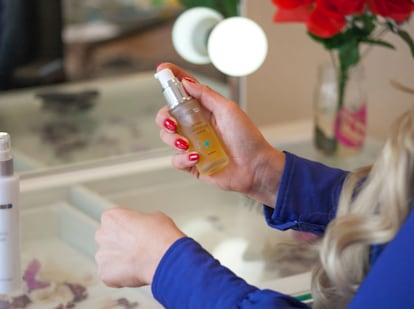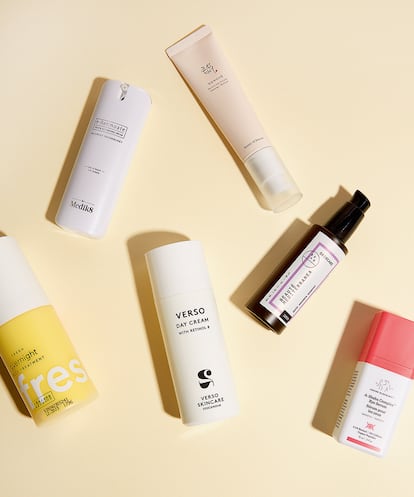The lights and shadows of retinol: New European regulations, formulas for sensitive skin and derivatives
This compound has replaced hyaluronic acid as the most sought-after active ingredient in skincare products, but its use still raises doubts

A European regulation will restrict retinol to a maximum concentration of 0.3% for facial products and 0.05% for body products. “It will not come into effect until 2025 or 2026, at which time [the brands] will have 18 months to stop producing it and 36 months for their stock to run out,” explains dermatologist Miguel Sánchez Viera, coordinator of the Spanish Group of Aesthetic and Therapeutic Dermatology (GEDET). However, although that is still a few years away, the news has raised concerns among the public: does this mean that this compound is dangerous? “This derivative of vitamin A has great scientific support, having proved its effectiveness against wrinkles, acne, spots and photoaging. Still, at high concentrations, misused and not prescribed by a specialist, it could cause irritations. Hence the importance of its regulation,” adds the doctor.

The p53 enzyme, crucial for the sun
“Retinoids increase the levels of this enzyme, which is known for being the guardian of DNA,” explains Isabel Reverte, technical director of the firm Rosalique. It is an essential protein for cells to adequately respond to extreme situations such as sun exposure or when experiencing rosacea outbreaks, recovering faster and better. Despite popular belief, “the recommendation to use retinol at night is not because it causes irritation if applied during the day, but because it is photosensitive. That is, the active ingredient dies with solar radiation, becoming inactive,” says cosmetologist and biotechnologist Sonia Ferreiro from Byoode cosmetics. In that case, it does not intensify the effects of the sun on the skin, but as the active ingredient can cause irritation, it is advisable to always use SPF (because the skin will be prone to inflammation).
3 to 6 hours
That is the time it takes for the new formulas to deliver the ingredient to the skin, gradually, to avoid irritation. “Retinol is highly sensitive to oxidation and degrades in the presence of air, sunlight, acidic conditions and heavy metals,” explains dermocosmetics expert Ana Santamarina, creator of Santamarina Cosmetics. Stabilized and microencapsulated, vitamin A improves its efficiency and prevents reactions.
Day and night?
Retinoids are not friends with light. “They are photosensitive; they lose their effectiveness with solar radiation. During the day they do nothing on the skin. This is why nighttime use is usually recommended, except with new formulations that get past this obstacle, such as retinyl retinoate,” says Sonia Ferreiro, technical manager of Ambari in Spain. Another alternative that works at any time of the day or night is bakuchiol: “It stimulates the production of collagen and elastin and cell renewal, reduces spots and redensifies the skin, but without the irritation of retinol,” explains cosmetologist and facialist Esther Moreno.
11 times faster
This is how effective retinal is (another derivative of vitamin A); so are retinol palmitates or acetates, which are less effective, and r-Retinoate, eight times more powerful than traditional retinol. “Retinal requires one less metabolic step to become the molecule that is active in the skin and usually presents fewer side effects in the adaptation or retinization period, being more tolerable for more sensitive skin. Sometimes it is recommended for skin with rosacea, to thicken it,” adds Elisabeth San Gregorio, technical director of Medik8.
Making the most of its properties
To introduce the active ingredient, it is advisable to “start with a retinyl palmitate and continue, once the skin has become retinized, with 0.3% retinol or a retinaldheide,” recommends Natividad Lorenzo, director of the beauty clinic that bears her name. It must also be taken into account that in order to receive retinol, the skin must be perfectly clean and dry. Also, “use the right dose of product and wait 15 minutes before applying another cosmetic. It should not be used around the eyes, unless it is a specific formula for this area,” warns beautician Marta García, from her eponymous beauty center.
Sign up for our weekly newsletter to get more English-language news coverage from EL PAÍS USA Edition
Tu suscripción se está usando en otro dispositivo
¿Quieres añadir otro usuario a tu suscripción?
Si continúas leyendo en este dispositivo, no se podrá leer en el otro.
FlechaTu suscripción se está usando en otro dispositivo y solo puedes acceder a EL PAÍS desde un dispositivo a la vez.
Si quieres compartir tu cuenta, cambia tu suscripción a la modalidad Premium, así podrás añadir otro usuario. Cada uno accederá con su propia cuenta de email, lo que os permitirá personalizar vuestra experiencia en EL PAÍS.
¿Tienes una suscripción de empresa? Accede aquí para contratar más cuentas.
En el caso de no saber quién está usando tu cuenta, te recomendamos cambiar tu contraseña aquí.
Si decides continuar compartiendo tu cuenta, este mensaje se mostrará en tu dispositivo y en el de la otra persona que está usando tu cuenta de forma indefinida, afectando a tu experiencia de lectura. Puedes consultar aquí los términos y condiciones de la suscripción digital.








































